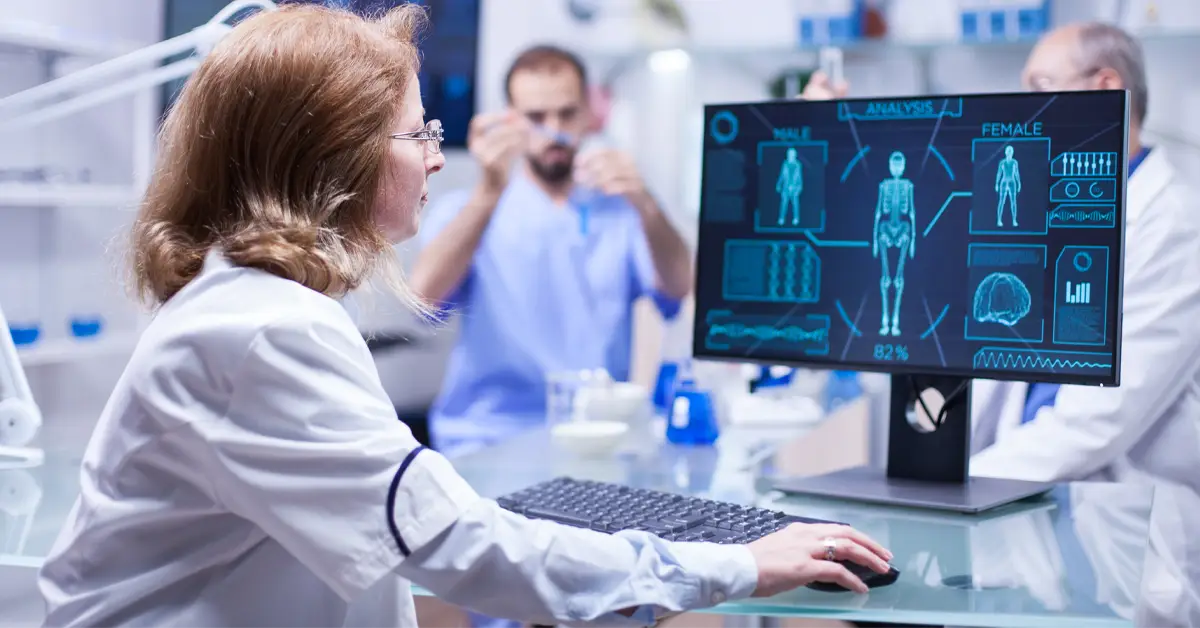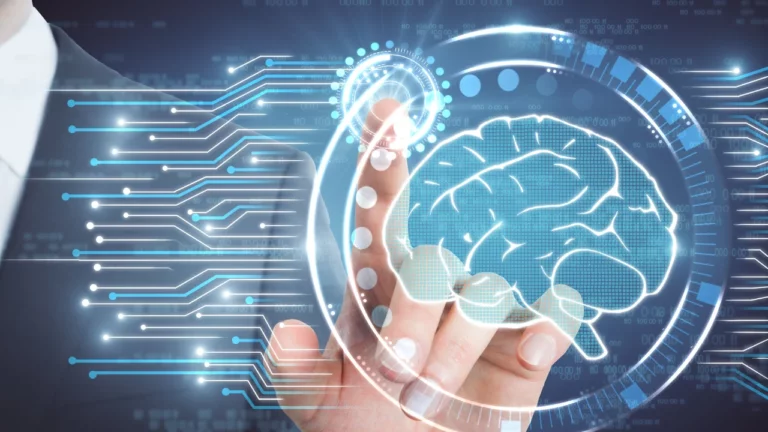The healthcare industry is undergoing a transformation with the integration of AI (Artificial Intelligence) and machine learning technologies. According to the National Library of Medicine (NIH), AI has the potential to revolutionize the way healthcare is delivered, making it more efficient and effective, especially in the area of remote patient monitoring. With AI, healthcare providers can now diagnose and treat patients more accurately, resulting in improved patient outcomes.
This article will provide a comprehensive overview of AI in healthcare and its impact on remote patient monitoring. With the use of AI and machine learning, healthcare providers can now deliver better patient care and outcomes, leading to a brighter future for the healthcare industry.
Artificial Intelligence in Healthcare
Artificial Intelligence (AI) is the future of healthcare. It is the integration of advanced AI technologies such as machine learning, deep learning, and natural language processing into healthcare delivery systems. The aim of AI in healthcare is to improve the accuracy and efficiency of healthcare delivery, leading to improved patient outcomes.
One of the primary applications of AI in healthcare is the use of machine learning algorithms to process and analyze vast amounts of medical data, health records, and medical images. With AI, healthcare providers can identify patterns and relationships in medical data, leading to more accurate diagnoses and improved treatment plans.
Another key area of application for AI in healthcare is in medical imaging analysis. With deep learning algorithms, AI can analyze millions of medical images and provide an accurate diagnosis, reducing the time and effort required for manual analysis.
AI in healthcare can also be used to personalize patient care and improve the patient experience. With the use of AI algorithms, healthcare providers can tailor treatments and care plans to the specific needs of each patient, leading to improved patient outcomes and satisfaction.
In addition, AI in healthcare has the potential to revolutionize clinical trials and medical research. With the ability to process and analyze vast amounts of medical data and health records, AI can help researchers identify new drug targets and better understand disease mechanisms, leading to the development of new and more effective treatments.
Machine Learning in Healthcare
Machine learning is a subfield of AI that focuses on the development of algorithms and models that can learn from and make predictions based on data. In healthcare, machine learning is used to analyze vast amounts of medical data, medical images, and health records to support clinical decision-making and improve patient outcomes.
One of the key applications of machine learning in healthcare is in medical imaging analysis. With machine learning algorithms, AI can analyze millions of medical images and provide an accurate diagnosis, reducing the time and effort required for manual analysis.
Another area of application for machine learning in healthcare is in the prediction of disease progression and patient outcomes. With machine learning algorithms, healthcare providers can analyze patient data, including health records and medical images, to predict the likelihood of a disease or condition and provide early intervention, leading to improved patient outcomes.
Machine learning is also used in healthcare to support clinical decision-making and improve patient care. With machine learning algorithms, healthcare providers can analyze vast amounts of medical data and health records to identify patterns and relationships, leading to more accurate diagnoses and improved treatment plans.
In addition, machine learning in healthcare is revolutionizing medical research and clinical trials. With the ability to process and analyze vast amounts of medical data and health records, machine learning algorithms can help researchers identify new drug targets and better understand disease mechanisms, leading to the development of new and more effective treatments.
Remote Patient Monitoring with AI
Remote patient monitoring (RPM) is the use of technology to monitor a patient’s health remotely. With the integration of AI, RPM has become a valuable tool for healthcare providers in the management of chronic conditions and the improvement of patient outcomes.
One of the key benefits of RPM with AI is that it enables real-time monitoring of a patient’s health, leading to early detection of potential health issues. AI-powered RPM can continuously monitor a patient’s vital signs, medication adherence, and other key health indicators, alerting healthcare providers to any potential issues before they become more serious.
Another benefit of RPM with AI is that it enables healthcare providers to better manage chronic conditions. With AI, healthcare providers can monitor a patient’s progress, identify any potential health issues, and adjust the patient’s treatment plan as needed. This leads to improved patient outcomes and reduces the need for hospitalization.
RPM with AI also supports patient self-management, helping patients take an active role in their own health. With the ability to monitor their health remotely, patients can make informed decisions about their care and communicate more effectively with their healthcare providers.
Natural Language Processing in Healthcare
Natural language processing (NLP) is a branch of artificial intelligence (AI) that focuses on the interaction between computers and humans through natural language. NLP has been applied in various fields such as healthcare, where it has been used to analyze and process large amounts of unstructured data, such as electronic health records (EHRs) and clinical notes. The use of NLP in healthcare has become increasingly relevant in recent years as healthcare organizations have begun to adopt AI technologies in their operations.
In healthcare, NLP has been used to extract meaningful information from EHRs and other medical data, which can then be used to improve patient care and health outcomes. NLP algorithms can also be used to automate tasks that would otherwise be time-consuming and repetitive for healthcare providers, such as medical coding and data entry. By utilizing NLP in these ways, healthcare organizations can improve their workflow and efficiency, ultimately leading to better patient outcomes.
Moreover, NLP can also play a role in the RPM aspect of AI in healthcare. By using NLP to analyze and process patient data from remote devices, healthcare providers can monitor patients’ health conditions and make informed decisions about their care. NLP can also help to improve communication between patients and healthcare providers, by allowing patients to communicate with their healthcare providers in a natural, conversational way.
Future of AI in Healthcare
The future of AI in healthcare looks promising with advancements in technology, healthcare data, and machine learning algorithms. As AI continues to be integrated into the healthcare system, it has the potential to revolutionize various aspects of patient care, including RPM. AI technologies like deep learning, natural language processing, and computer vision are already being used in healthcare to assist healthcare professionals in making diagnoses, predicting health outcomes, and improving patient care.
Moreover, with the increasing amounts of healthcare data being generated and the rise of precision medicine, the NIH expects AI to play a significant role in medical research and development. AI algorithms will help researchers and clinicians better understand medical information and data, making it possible to uncover new insights and developments in the medical field.
In the coming years, healthcare organizations will likely undertake substantial integration projects to implement AI systems into their workflows and processes. This will likely result in the creation of new healthcare jobs and career opportunities, as well as new applications for AI in healthcare. The potential benefits of AI in healthcare are numerous, and it is safe to say that the future of AI in healthcare looks very promising.
DrKumo AI-Driven Remote Patient Monitoring Technology Solutions
Artificial Intelligence (AI) is revolutionizing the way healthcare is delivered and received, especially in the face of the current global health crisis. One company at the forefront of this revolution is DrKumo, a technology leader in highly scalable, continuous, real-time RPM solutions.
DrKumo Next-Gen RPM solutions are designed to overcome the barriers to healthcare access faced by elderly and rural populations. The company’s AI-driven technology empowers healthcare providers to make informed decisions through insights generated by multicast data live streaming. This patient-centric care accelerates care delivery into patients’ homes, providing them with timely and easy access to quality healthcare, without the need for travel.
The company’s innovative, collaborative, and technology-driven culture is focused on solving the most painful problems in healthcare with a user-friendly solution. DrKumo RPM technology is powered by its state-of-the-art, HIPAA-compliant, mobile-enabled, continuous real-time monitoring and AI/ML engine. The technology enables patients to manage their health conditions from the comfort of their homes and supports healthcare providers with real-time intelligence for timely interventions.
Takeaways
The integration of AI in healthcare is transforming the way patients are monitored and treated, particularly in the area of RPM. With the use of AI algorithms and deep learning techniques, healthcare providers can make informed decisions and improve health outcomes. The adoption of AI in healthcare is also creating new job opportunities.
Join the revolution in healthcare by exploring the potential of AI, Machine Learning, and Remote Patient Monitoring to enhance patient outcomes and improve the delivery of care. Contact DrKumo now.








